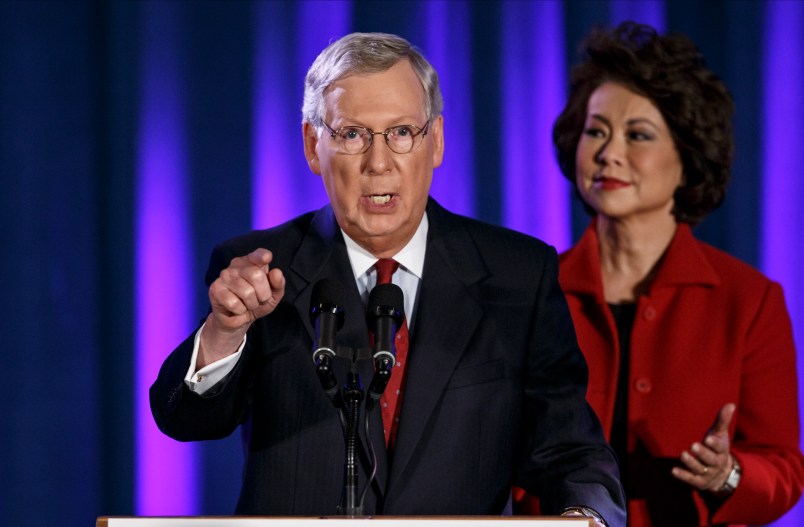After blowing two historic opportunities in 2010 and 2012 to claim control of the Senate, Republicans finally seized their moment on Tuesday night, winning control of the chamber after eight uninterrupted years of Democratic rule.
Republicans crossed the majority threshold after the networks projected victories in contested races in Arkansas (Tom Cotton), North Carolina (Thom Tillis) and Iowa (Joni Ernst). They picked up open seats in South Dakota (Mike Rounds), Montana (Steve Daines) and West Virginia (Shelly Moore Capito). They comfortably held their seats in Kansas (Sen. Pat Roberts) and Georgia (David Perdue), two races which remained competitive in the final stretch.
Republican Sen. Mitch McConnell, who easily won his hard-fought reelection fight in Kentucky, has achieved his lifelong dream as he’s about to become the Senate majority leader in January.
“The future I see is a bright one,” he said in his victory speech. “Americans have seen that what the current crowd in Washington is offering is making us weaker at home and abroad. They’ve had enough. They’re ready to move on.”
The Louisiana Senate race has yet to be decided, with Democratic Sen. Mary Landrieu and Republican Bill Cassidy headed to a runoff on December 6. Cassidy has a lead in head-to-head polls.
The most immediate — and likely most significant — consequence will be for President Barack Obama’s nominations. The GOP Senate will have effective veto power over any judicial or executive branch nominee they disapprove of. That carries major implications for Obama’s judicial legacy in particular as Republicans could grind federal court nominations to a halt.
Then there are committee chairmanships that Republicans are set to take over, featuring Sen. Chuck Grassley (IA) at the Judiciary Committee and Sen. Orrin Hatch (UT) at the Finance Committee.

Sens. Orrin Hatch (R-UT) and Chuck Grassley (R-IA) (AP Photo/J. Scott Applewhite)
“One thing the media tends to overlook — the big shift obviously is control of the committees. Truth be told, there’s not a huge big difference between being a couple of seats in the majority or a couple of seats in the minority,” said a former Senate Republican leadership aide.
A Republican-led Senate isn’t likely to usher in major legislative reforms, due to the enormous gulf that will remain between the White House and Republican-led House. But there could be escalated showdowns over health care and climate change, as McConnell has repeatedly vowed to use the appropriations process to attach “riders” to unwind Obama’s regulatory reforms.
One major question is how far the Republican Congress tries to go in repealing Obamacare. McConnell has downplayed expectations for a full repeal, observing that it’ll take 60 votes, but he has left the door open to targeting budgetary aspects of the law under a procedure that requires only 51 votes.
Environmental activists are particularly worried that a GOP Congress could pass legislation to force Obama to approve the Keystone XL pipeline. They also expect Republicans to target Obama’s executive actions on climate change, such as restrictions on coal-fired power plant emissions and clean water rules.

From left: Reps. John Boehner (R-OH) and Nancy Pelosi (D-CA), and Sens. Mitch McConnell (R-KY) and Harry Reid (D-NV) (AP Photo/Jacquelyn Martin).
“Overall on climate I think they could take us in the wrong direction if they do end up winning the Senate,” a Democratic official with ties to the White House said recently. “Whether that’s trying to shut down the government over EPA rules, who knows?” The official worried that Republicans might pass a bill authorizing the Keystone pipeline and put the White House in a tough position between Congress and climate change advocates.
One wildcard is how the Republican Congress responds to Obama’s promised executive actions on immigration and deportations, which they fiercely oppose. Sen. Jeff Sessions (AL), next in line to chair the Budget Committee, has been gearing up for a major fight against the president’s upcoming actions, promised by the end of the year.
The 2014 cycle was a perfect storm for the Democrats: an unpopular president in his sixth year, a low-turnout midterm year for the party and a map where most competitive races were fought in states that President Obama lost.
“The worst case scenario for the country is both sides just remain entrenched and just point the finger at each other,” the former GOP leadership aide said. “And yeah, [a Republican Congress is] the creation of a perfect foil if the president does want to stick with the narrative of Republican obstruction. That’s the downside for us.”
Senate Majority Leader Harry Reid (D-NV) congratulated his successor on Tuesday night.
“I’d like to congratulate Senator McConnell, who will be the new Senate
Majority Leader,” he said. “The message from voters is clear: they want us to work together. I look forward to working with Senator McConnell to get things done for the middle class.”







goddamit
not much else to say.
The same applies to the governors’ races. I live in Illinois and I cannot believe my fellow citizens voted for Rauner (same is true for residents of Wisconsin and Florida) What is wrong with us???
Hopefully they won’t do too much damage before 2016 when the tide turns and GOP has 24 seats to defend and the Dems only 9.
This is a big step up for Sahil Kapur. He now gets to report as fact the spin coming from the Majority leader rather than the Minority leader.
the next two years are going to result in some of the most damaging policies this country has seen in years. regulatory agencies will be gutted; taxes for wealthy will be eliminated; social programs will be whittled down to nothing; dismantling of the aca…
let the blame game begin.